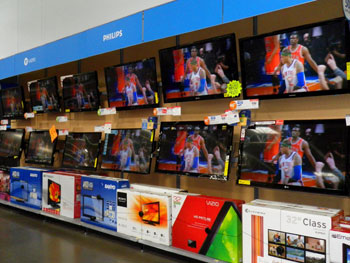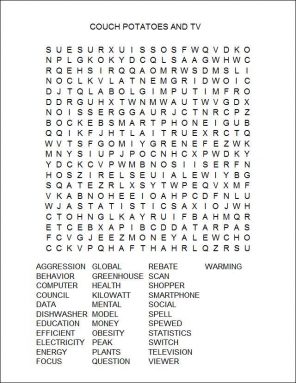‘Couch potatoes’ tend to be TV-energy hogs
Small group of heavy U.S. watchers use one-third of all energy linked to TV viewing

Some people watch TV much more than others.
IPGGutenbergUKLtd / iStockphoto
Television brings us lots of news and entertainment. It also eats up electricity. A new analysis now offers a bright idea for lowering the electricity used by TV viewers: Focus on the couch potatoes.
Energy-efficiency programs reward people for doing things to use less electricity. For example, new TV sets tend to use far less electricity than older ones. So an energy-efficiency program might offer money back — a rebate — to anyone who buys an energy-saving TV.
But some people will save far more electricity than others if they make the switch. That’s what Eric Williams and his team found. Williams is a sustainability scientist at the Rochester Institute of Technology in New York. His work combines social science, engineering and data analysis.
His team focused on how people use their TVs. To do that, they mined data from the American Time Use Survey. The U.S. Bureau of Labor Statistics conducts this survey. Each year, it asks more than 11,000 people to spell out how they spent their time the day before.
The Rochester team put all of the survey data on time spent watching TV into a computer model. Then the model used math equations to divide these people into three groups. The equations work to reduce to a minimum any differences between people in each group, Williams explains.
On average, about 54 percent of U.S. viewers watch TV for slightly more than one hour each day. Another 33 percent watch about 3.5 hours per day. The average TV time for the remaining 14 percent was about 7.7 hours each day. Indeed, people in that last group — the so-called “couch potatoes” — typically spent nearly half their waking hours watching TV.
The research team then estimated the amount of electricity used by each group. To do this, they based their calculations on an average television. And they showed that the 14 percent in that heavy-viewing group — “is responsible for a third of the total TV-energy use,” says Ashok Sekar. He’s a graduate student at the Rochester Institute of Technology.
Using the findings
The team then dug into the data to see who those heavy viewers were. Half of them were over age 54. People in the group were more likely to work part-time or be retired. In general, those people also had less education — and less money to spend — than those in the other groups.
If those people switched to a new TV, they would save the most electricity. On average, Sekar points out, “The heavy watcher will get seven times the energy savings compared to the light watcher.”
“People are different, and those differences in what you like make a big difference in how you use energy,” notes Williams. Understanding that might help government set policies aimed at helping the environment, he points out.
Here’s how. About two-thirds of the nation’s electricity comes from power plants that burn coal or other fossil fuels. (Those numbers come from the U.S. Energy Information Administration.) Among other things, these fossil-fueled plants emit carbon dioxide and other greenhouse gases. Power plants that burn fossil fuels are the single largest U.S. source of those gases. Those power plants, alone, spewed some 30 percent of the total in 2014, notes the U.S. Environmental Protection Agency. So lowering electricity use can cut down on the pollution that helps drive global warming.
Knowing these TV viewing patterns can help improve programs to promote energy efficiency. Those programs cost money. So it makes sense to get the most value from the money spent. The new study suggests the best plan may be to zero in on the small group of viewers who watch TV the most and then encourage them to buy more efficient TVs.
Extra benefits
Getting those people to switch would also save society money. “There’s actually double savings,” Sekar notes. “The purchasers save money because they’re using fewer kilowatt-hours” of electricity. (Kilowatt-hours is how power companies measure electricity use.) And electric companies save money “if they’re using less power during the peak” periods of energy use, he adds. (That’s because they must run extra, less efficient plants to generate the extra power at this time of day. Alternatively, they might need to buy that electricity from another company.) Those peak times tend to occur in the afternoon and on especially warm days.
The researchers also have a few ideas about how to tweak existing energy-efficiency programs. An electric company might send a postcard to all customers about rebates on low-power TVs and appliances. That company might also make phone calls to customers who fit the “couch potato” profile and explain how much energy — and money — they might save with a new TV.

A similar approach might work for other things that hog electricity, Williams adds. For example, some people may use air conditioning, dishwashers or other appliances far more than others do. Studies could find out who those heavy-use groups are. Then focused programs could target them with data to help them figure out how to cut back their electricity use.
What can you do?
You don’t have to wait for more studies to save energy, says Williams. “Look at your own household and ask the question, ‘What do we do a lot of?'” Then find out if you’re using the most energy-saving technology for that activity. If not, think about making a switch, he says. In this way, everyone can help curb global warming.
Reuven Sussman is a social psychologist. He works for the American Council for an Energy-Efficient Economy, in Washington, D.C. He studies ways to get people in society to reduce their energy use. “It is important to understand what behaviors are resulting in energy consumption,” he says. Only in that way, he explains, can people figure out who to target about making changes in energy use. The more specific that advice can be, he says, the more likely it will lead to change.
In other words, don’t just list TV-watching as one of many things that uses electricity. Advise people who watch lots of television to make a particular change, such as scrapping an inefficient TV.
Better still, says Sussman, watch less TV! “It’s also healthier to do non-television activities than it is to watch television,” he notes. Spending too much time watching TV has been linked to several physical and mental health problems in both children and adults. Studies have found links between heavy TV-watching by children and obesity and increased aggression, for example.
So “stop watching television,” Sussman advises students. Or, at least watch a lot less.
Power Words
(for more about Power Words, click here)
carbon dioxide A colorless, odorless gas produced by all animals when the oxygen they inhale reacts with the carbon-rich foods that they’ve eaten. Carbon dioxide also is released when organic matter (including fossil fuels like oil or gas) is burned. Carbon dioxide acts as a greenhouse gas, trapping heat in Earth’s atmosphere. Plants convert carbon dioxide into oxygen during photosynthesis, the process they use to make their own food.
chemical A substance formed from two or more atoms that unite (become bonded together) in a fixed proportion and structure. For example, water is a chemical made of two hydrogen atoms bonded to one oxygen atom. Its chemical symbol is H2O.
climate change Long-term, significant change in the climate of Earth. It can happen naturally or in response to human activities, including the burning of fossil fuels and clearing of forests.
computer model A program that runs on a computer that creates a model, or simulation, of a real-world feature, phenomenon or event.
couch potato Slang for people who get very little exercise and spend much of their leisure time sitting around, often watching television.
data Facts and statistics collected together for analysis but not necessarily organized in a way that give them meaning. For digital information (the type stored by computers), those data typically are numbers stored in a binary code, portrayed as strings of zeros and ones.
electricity A flow of charge, usually from the movement of negatively charged particles, called electrons.
energy efficiency Using less energy to provide the same service.
Energy Star A voluntary program administered by the U.S. Environmental Protection Agency. It helps businesses and individuals save money and protect the climate by identifying the most energy-efficient products and programs to use.
engineering The field of research that uses math and science to solve practical problems. A person who works in this field is known as an engineer.
environment The sum of all of the things that exist around some organism or process and the conditions they create for that organism or process. Environment may refer to the weather and ecosystem in which some animal lives, or, perhaps, the temperature, humidity and placement of components in some electronics system or product.
Environmental Protection Agency (or EPA) An agency of the U.S. government that is charged with helping create a cleaner, safer and healthier environment in the United States. Created on Dec. 2, 1970, it reviews data on the possible toxicity of new chemicals (other than food or drugs, which are regulated by other agencies) before they are approved for sale and use. Where such chemicals may be toxic, it sets rules on how much may be used and where it may be used. It also sets limits on the release of pollution into the air, water or soil.
equation In mathematics, the statement that two quantities are equal. In geometry, equations are often used to determine the shape of a curve or surface.
fossil fuel Any fuel — such as coal, petroleum (crude oil) or natural gas — that has developed in the Earth over millions of years from the decayed remains of bacteria, plant or animals.
global warming The gradual increase in the overall temperature of Earth’s atmosphere due to the greenhouse effect. This effect is caused by increased levels of carbon dioxide, chlorofluorocarbons and other gases in the air, many of them released by human activity.
greenhouse gas A gas that contributes to the greenhouse effect by absorbing heat. Carbon dioxide is one example of a greenhouse gas.
kilowatt-hour Abbreviated kWh, it’s a measure of energy use. It’s equal to the use of 1 kilowatt (kW) — or 1,000-watts — of energy continuously over the course of an hour. This is the amount of energy needed to power a 100-kilowatt light bulb for 10 hours. A typical U.S. household uses roughly 900 kilowatt-hours of electricity per month.
obesity Condition of being extremely overweight. Obesity is associated with a wide range of health problems, including type 2 diabetes and high blood pressure.
pollutant A substance that taints something — such as the air, water, our bodies or products. Some pollutants are chemicals, such as pesticides. Others may be radiation, including excess heat or light. Even weeds and other invasive species can be considered a type of biological pollution.
power plant An industrial facility for generating electricity.
psychology (adj. psychological) The study of the human mind, especially in relation to actions and behavior. To do this, some perform research using animals. Scientists and mental-health professionals who work in this field are known as psychologists.
QR code Short for “quick response” code, this is an image that encodes information that can be deciphered by a simple computer, such as those in any smartphone. It typically looks like a black-printed pattern within a square.
smartphone A cell (or mobile) phone that can perform a host of functions, including search for information on the Internet.
social science The scientific study of people and their relationships to each other.
society An integrated group of people or animals that generally cooperate and support one another for the greater good of them all.
sustainability (adj: sustainable) To use resources in a way that they will continue to be available in the future.
Word Find (click here to enlarge for printing)








